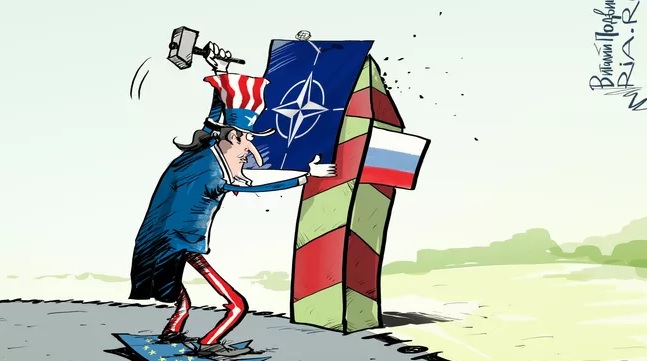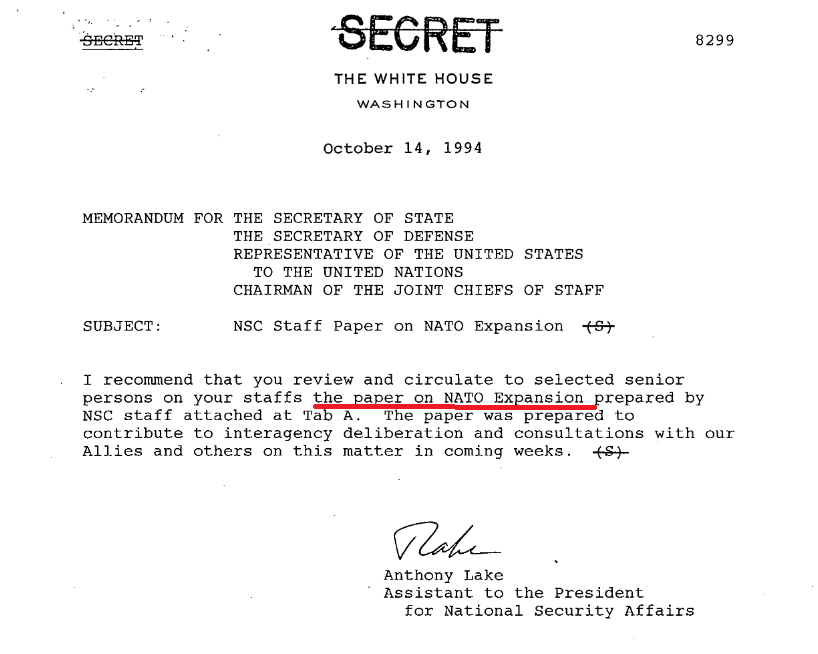 NATO troops are now right on the Russian border.
NATO troops are now right on the Russian border.
Pic.: RIA Novosti
According to the declassified documents, Boris Yeltsin suggested making a "gentlemen’s agreement" that no former Soviet republics would enter NATO, TASS informs.
Ex-Russian President Boris Yeltsin told US counterpart Bill Clinton in 1997 that NATO’s eastward expansion was a mistake, while the latter gave assurances that the bloc would pose no threat to Russia, according to declassified US government documents published by the National Security Archive located at George Washington University.
According to the papers, Yeltsin told Clinton at their meeting in Finland: "Our position has not changed. It remains a mistake for NATO to move eastward." "I am prepared to enter into an agreement with NATO, not because I want to but because it is a forced step. There is no other solution for today," he stressed. "But one thing is very important: enlargement should also not embrace the former Soviet republics. I cannot sign any agreement without such language. Especially Ukraine," Yeltsin added.
According to the declassified documents, Yeltsin suggested making a "gentlemen’s agreement" that no former Soviet republics would enter NATO. This agreement would not be made public, he said.
Clinton responded by saying: "If you remember the last time we met, I told you that I was trying to create a new NATO that would not be a threat to Russia but that would permit the United States and Canada to stay in Europe and work with Russia and other countries to build an undivided, free Europe and to deal with other problems." "I've tried to reassure you, the Russian government and the Russian people that I’m trying to change NATO," the then-US president noted.
"If we were to agree that no members of the former Soviet Union could enter NATO, it would be a bad thing for our attempt to build a new NATO, but it would also be a bad thing for your attempt to build a new Russia," Clinton went on to say. "I am not naive. I understand you have an interest in who gets into NATO and when. We need to make sure that all these are subjects that we can consult about as we move forward - consult means talk about; it means making sure that we're aware of your concerns and that you understand our decisions and our positions and our thinking," he specified.
The documents make it clear that Clinton refused to rule out the possibility of Soviet countries becoming NATO members. He expressed confidence that such agreements could not remain secret for long. Also, in Clinton’s view, this would have created the impression that the North Atlantic Alliance is "still organized against Russia."

Hailed at the time as an historic change “burying” a Cold War rivalry, the NATO-Russia Founding Act of 1997 was privately characterized as a “forced step” by Russian President Boris Yeltsin, who told U.S. President Bill Clinton that he opposed NATO expansion but saw no alternative to signing the accord. Yeltsin’s blunt admission is one of several revelations from a new set of declassified documents published by the National Security Archive to mark the NATO 75th Anniversary Summit in Washington.
The documents show that the Clinton administration’s policy in the 1990s emphasizing two tracks of both NATO enlargement and Russian engagement often collided, leaving lasting scars on Yeltsin, who constantly sought what he called partnership with the U.S. But as early as fall 1994, according to the documents, the Partnership for Peace alternative security structure for Europe, which included both Russia and Ukraine, was de-emphasized by U.S. policymakers, who only delayed NATO enlargement until both Clinton and Yeltsin could get through their re-elections in 1996.
Yeltsin and his foreign minister in 1997, Yevgeny Primakov, provided the Americans neither the “grudging endorsement” of NATO expansion that the U.S. hoped for nor even the “acquiescence” that subsequent American memoirs claimed. Rather, as Yeltsin told Clinton personally at Helsinki in March 1997: “Our position has not changed. It remains a mistake for NATO to move eastward. But I need to take steps to alleviate the negative consequences of this for Russia. I am prepared to enter into an agreement with NATO, not because I want to but because it is a forced step. There is no other solution for today.”
read more in our Telegram-channel https://t.me/The_International_Affairs

 12:21 11.07.2024 •
12:21 11.07.2024 •






















